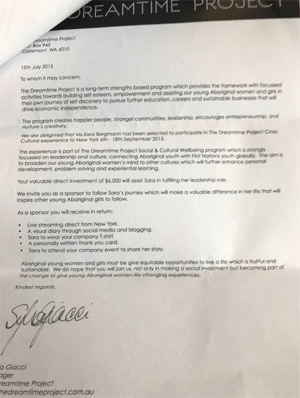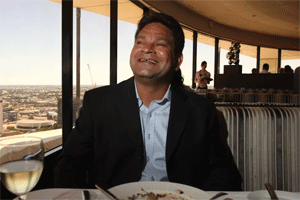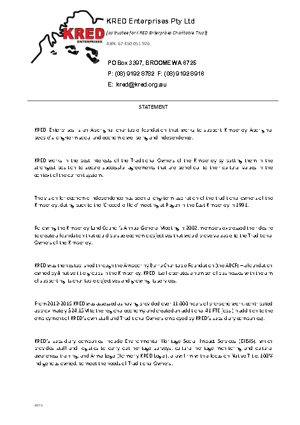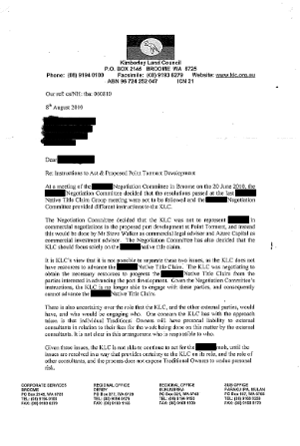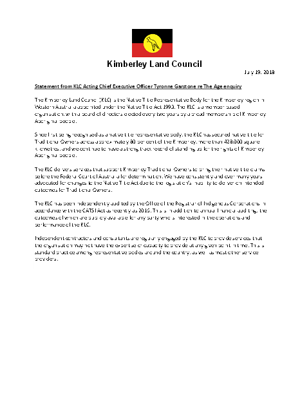Native entitlement: Wheeling and dealing in the Kimberley

Wayne Bergmann. Photo: Joe Armao
Former Kimberley Land Council chief executive Wayne Bergmann holds enormous power over the fate of mining companies and traditional owners in his new role.
Richard Baker The Age 27 July 2018
A few years ago, a handful of Australian resource company executives received an unusual proposal in the mail. Would their companies contribute $6000 each to help send a young indigenous woman from the Kimberley to New York to attend the Big Apple's fashion show?"
Fashion is just the vehicle that teaches the girls important life skills," the letter explained. "Learning to walk on the catwalk is teaching us far more than modelling."
It's not uncommon for resource companies with development plans in the Kimberley and other remote areas to provide sponsorship to build community relations. Usually, it's for a local sporting club. But this particular request, as politely as it was expressed, posed a problem.
It came from the adult daughter of Wayne Bergmann, the former chief executive of the Kimberley Land Council. Bergmann now leads an entity closely related to the land council called KRED Enterprises, and he remains a special adviser to the land council's board, which is chaired by his friend, Anthony Watson. And in a nod to just how cosy things have been in the Kimberley, Watson was also KRED's inaugural chairman.
KRED's business is with the land council, which is universally known as the KLC. It is authorised by the land council and traditional owners to negotiate multi-million-dollar agreements with resource companies. During his time running the land council, Bergmann achieved great success in getting vast amounts of the Kimberley covered by native title. This meant traditional owners in the Kimberley now had a seat at the table to negotiate with companies wanting to mine their lands.
The traditional owners have the option to trade off access to their land with life-changing payments, job training and the promise of long-term economic inclusion. But to get the best deal, they need someone who talks the same language as the mining companies and this is where KRED comes in.
Going back to Bergmann's daughter's New York request, the resource company executives were in a bind. If they paid up, they risked being accused of providing a benefit to the family of the man with the power to make or break their projects. But if they didn't, they risked getting Bergmann offside and receiving a spray of the kind that some had experienced during negotiations.
"Give me a call because things are going to get worse," Bergmann said in one voicemail message to the chairman of Sheffield Resources, an ASX-listed mining company."Your staff have been undermining me personally all over Broome and the business community in Perth. The relationship between Sheffield and traditional owners are going to turn to a new level. Since you put Bruce McFadzean [Sheffield CEO] on board, the relationship has gone from 10 to 0.
"The message came as negotiations between KRED and the mining company began to deteriorate. In the end, the resource companies declined Bergmann's daughter's modelling request. Given they were paying her father $450 an hour to represent traditional owners, the executives felt he could afford to pay.
Wayne Bergmann is regarded by traditional owners and mining company executives as the gatekeeper to the Kimberley. In 2012, not long after he finished his successful term as KLC chief executive, the land council outsourced the profitable parts of the native title process such as commercial negotiations, legal advice and heritage surveys to the newly formed company, KRED.
The rationale was to turn areas that were costing the KLC money into a profit centre which would in turn boost indigenous economic development and provide higher-quality representation for traditional owners. The decision to outsource such work to Bergmann's new venture has delivered more than $20 million in revenues to KRED. This money is paid into a charitable trust owned by eight traditional owner groups.
But when KRED staff salaries - which are running at $2 million a year - payments to traditional owner groups of around $800,000 annually and a host of other expenses are taken into account, the charitable trust has distributed just $57,000 in scholarships between 2014 and 2017
Bergmann, who declined an interview request and did not answer specific questions, said in a statement that KRED has created 41 full-time-equivalent jobs and contributed more than 11,000 hours of pro-bono work
When the KLC announced the outsourcing of heritage and commercial work to KRED, it assured its members they remained free to choose their own representatives. But documents leaked to The Age indicate this has not always been the case.
Just as KRED was about to be formed, a traditional owner group near Derby told the KLC it did not want to involve Bergmann in negotiations with potential investors for a proposed development. It had someone else for the job
This did not go down well at the KLC. The land council told the traditional owners it would cease working on their native title claim, which is the main reason the KLC exists and why it receives millions in taxpayer funds each year.
Nolan Hunter, Bergmann's successor as KLC chief executive, wrote: "It is the KLC's view that it is not possible to separate these two issues, as the KLC does not have the resources to advance the . . . native title claim.
"The KLC's use of native title as leverage resulted in the traditional owners agreeing to allow Bergmann's new entity to be written into a draft agreement and to receive a cut of the traditional owners' stake.
KRED's insistence on charging local and often poorly resourced Aboriginal groups the same rates as stock exchange listed mining companies has also put it offside with locals
KRED issued a $20,000 bill to one Aboriginal corporation for a one-day meeting with nearby traditional owners. This demand, according to a well-placed source, was rejected on the basis that, "blackfellas don't pay to talk to other blackfellas.
"A petition signed by hundreds of traditional owners from the Looma and Noonkanbah communities seeking KRED's removal as their representative was lodged this month with the federal government.
One of the first things a resources company must do when it starts to negotiate an agreement in the Kimberley is to sign a confidentiality agreement with KRED. It prevents companies from taking anything that happens across the negotiation table to external parties.
There is no argument against traditional owners needing strong representation to ensure they are not exploited by companies. And Bergmann is respected on all sides for his fierce advocacy and commercial mind.
But there is a feeling among the handful of resource companies with projects in the Kimberley that KRED has been given too much power and costs too much. Company executives, speaking on the condition of anonymity, say that getting the same work done in the Pilbara is far cheaper.
Despite the confidentiality agreements, The Age has seen correspondence between KRED and mining companies about disputed invoices worth hundreds of thousands of dollars.

In one small but telling example, a company was asked to pay a $1000 travel bill for then KRED chairman Anthony Watson even though he was in Perth already on unrelated business.
Resource company executives believe because KRED conducts the heritage surveys which companies need to be approved before works can begin, it can use the tactic of delay to force their arm.
The Age has seen documents detailing how one company was still waiting 184 days after it was due to receive a heritage report it had paid KRED for.
In another case, a company which had been disputing KRED invoices was given a heritage report which cleared the area of land for development only to be told later that day that the wrong report had been sent. It was to stand by for another report. The second report declared the land was not able to be developed.
Two highly confidential documents leaked to The Age are KRED's co-existence agreements with traditional owners and mining companies, Northern Minerals and the now defunct Pluton Resources.
The deals are a testament to Bergmann's negotiation skills. They delivered huge upfront payments to the relevant traditional owner groups, ongoing royalties, shares and options and opportunities for locally-owned businesses to get contracts associated with the mine.
The contentious part of these agreements is how KRED, whose services were being paid for by the mining companies, wrote itself into the deals after securing consent from traditional owners to negotiate on their behalf. The leaked agreements show KRED won up front payments of hundreds-of-thousands-of-dollars, royalties, shares and options in the companies, which are held in KRED's charitable trust.
Some in the Kimberley believe KRED's insistence that it be inserted into these deals reduces the benefits going to traditional owners. The counter view is that, because the money goes into a charitable trust, it can be used to increase economic activity across the wider region.
Liberal Senator for Western Australia, Dean Smith, highlighted the growing tensions between exploration companies and the representatives of traditional owner groups in a short speech in the senate 13 months ago.
Without naming any names, Senator Smith said: "Anecdotal evidence shows that withholding cultural heritage information after a heritage survey is becoming increasingly prevalent as a means to extract further payments from resource companies.
"Federal Indigenous Affairs Minister Nigel Scullion is aware of concerns about the relationship between the KLC and KRED.
He advised in a letter to his West Australian ministerial counterpart Ben Wyatt in May that his department had referred some allegations about KRED to the Australian Securities and Investments Commission and the Australian Charities and Not-for-profits Commission.
It is not known what, if any, action these agencies have taken.
A 2016 examination by the Office for the Registrar of Indigenous Corporations found the standard of corporate governance at the KLC was "generally sound".


